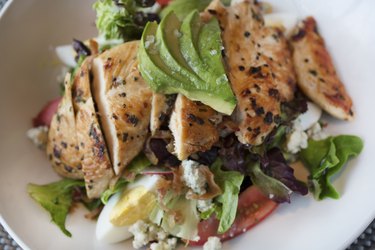Cross-country runners have different nutritional needs than nonrunners. They require an increase in certain nutrients to provide sustained energy for long distance runs. The best diet for running cross-country consists of a precise ratio of protein, fat, carbohydrates and iron. This mix enables a runner's body to operate at peak performance.
Water

First and foremost, cross-country runners must remain hydrated. According to Purdue University, cross-country runners should consume a great deal more water than nonathletes. When you run, energy is released as heat. Your body uses water to sweat and cool itself to prevent overheating. Water also helps prevent muscle fatigue and cramping. Cross-country runners lose four to eight pounds of water every hour. To find out how much water you need to drink, weigh yourself before and after training. For every pound you lose while training, drink 16 ounces of water.
Video of the Day
Video of the Day
Iron
A cross-country runner's diet should include iron-rich foods. According to the University of Chicago, iron helps produce red blood cells and carry oxygen throughout the body. This is essential for maintaining athletic endurance. Iron-rich foods include meat, poultry, fish, leafy green vegetables, beans and whole wheat bread. Do not take iron supplements unless your doctor recommends them. Too much iron can lead to constipation.
Carbohydrates
Load up on carbohydrates if you're a cross-country runner. According to Colorado State University, carbohydrates produce more energy than the same amount of protein. Cross-country runners have more endurance with ample amounts of carbohydrates stored in their bodies. Complex carbohydrates last longer than simple carbohydrates derived from sugar. Cross-country runners should get 70 percent of their energy from complex carbohydrates. A diet that includes whole grain spaghetti, potatoes and whole grain bread eaten two to three days before a race will fill up your glycogen storage spaces.
Protein
Protein is also essential in the diet of cross-country runners. While the primary energy comes from carbohydrates, protein is burned as well. Protein is also essential for muscle repair and recovery. According to Greg Crowther of the University of Washington, runners require more protein than sedentary people because of the intense demands they place on their bodies. At least 15 percent of your calories should come from protein sources like meat, eggs, tofu and low-fat dairy products. Endurance athletes should eat about 2.5 grams of protein per day for every pound of body weight.
Fats
Don't fear the fats. If you run for more than one hour, your body will turn to fats for most of its energy. Cross-country runners must train their bodies to efficiently utilize fat for energy. To do this, they must consume good fats like omega-3 fatty acids, polyunsaturated fat and monounsaturated fat. These are found in olive oil, fish and vegetable oil. Avoid bad fats like trans fats and fatty red meat.